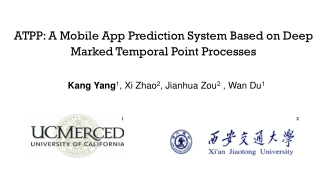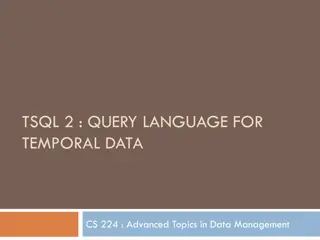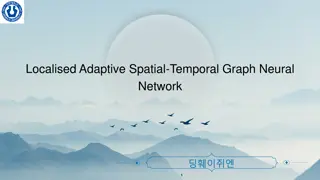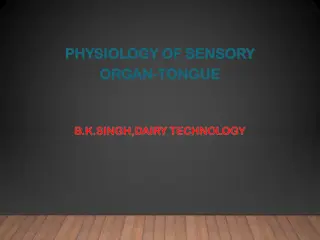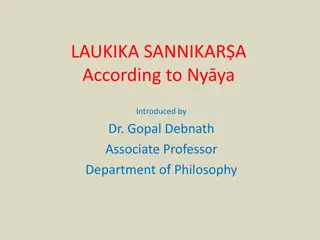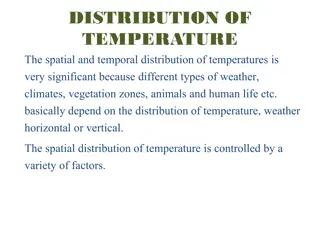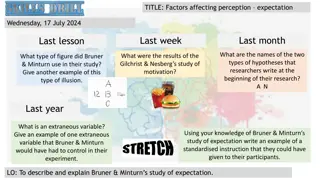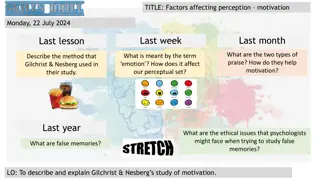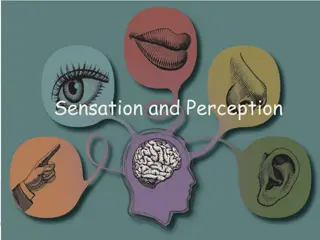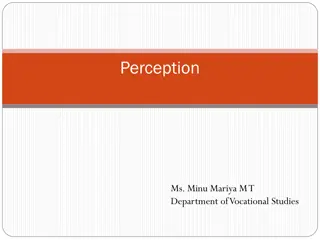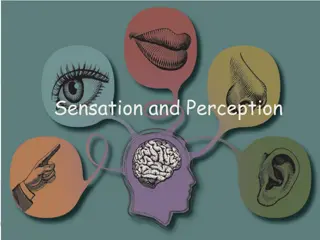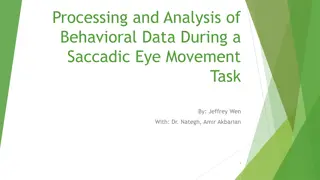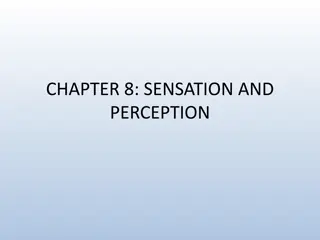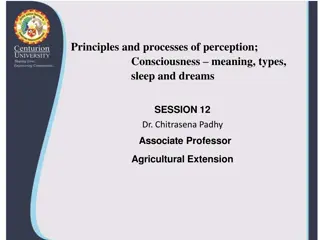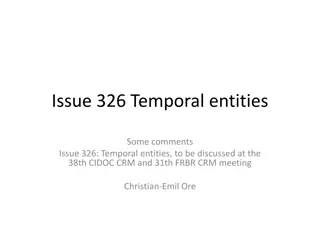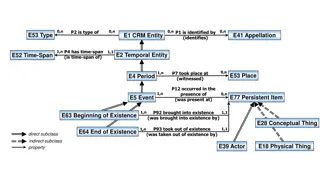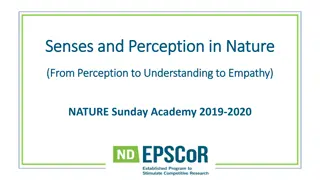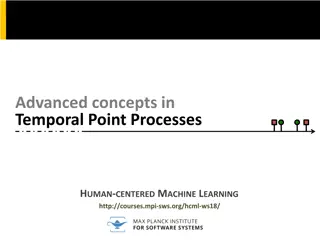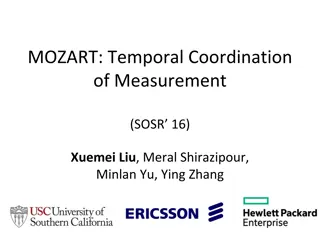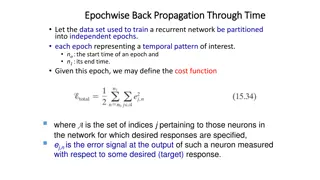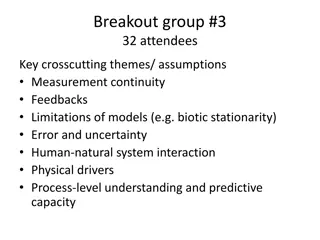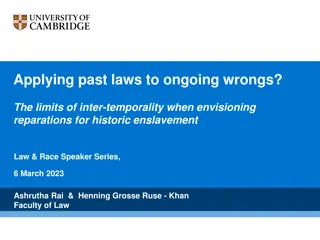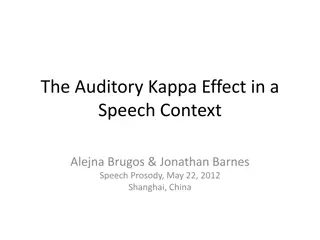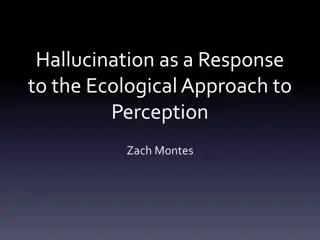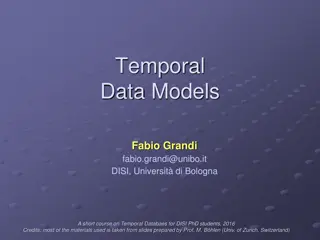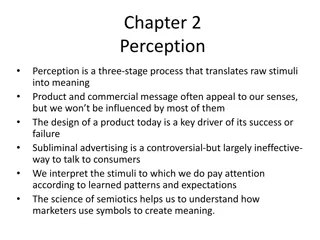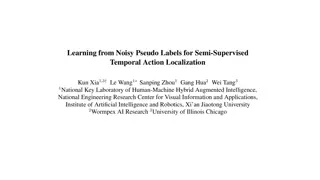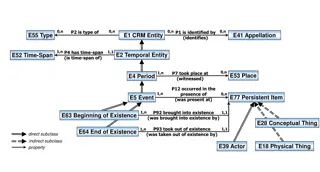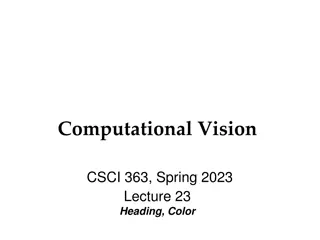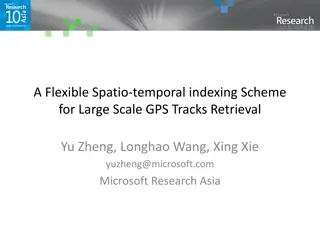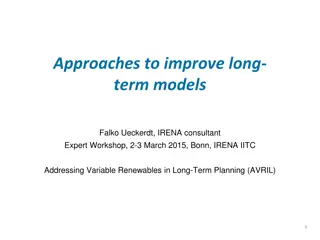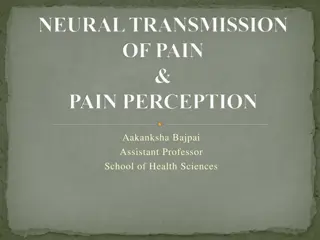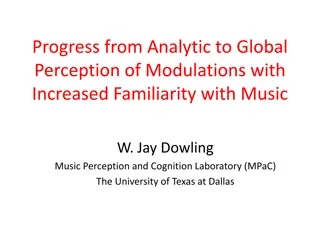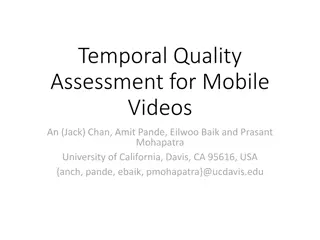Semi-Supervised Credit Card Fraud Detection via Attribute-Driven Graph Representation
Explore a novel approach for detecting credit card fraud using a semi-supervised attribute-driven graph representation. The technique leverages temporal aggregation and attention layers to automatically unify heterogeneous categorical attributes and detect fraudulent transactions without label leaka
1 views • 23 slides
Deep Reinforcement Learning for Mobile App Prediction
This research focuses on a system, known as ATPP, based on deep marked temporal point processes, designed for predicting mobile app usage patterns. By leveraging deep reinforcement learning frameworks and context-aware modules, the system aims to predict the next app a user will open, along with its
0 views • 24 slides
Temporal Data Management in TSQL Queries
Explore the realm of temporal data in TSQL queries, delving into the concepts of valid time and transaction time, different types of relations like snapshot and bi-temporal, and the significance of time dimensions in database management. Learn how temporal databases support time-related queries for
6 views • 41 slides
Localised Adaptive Spatial-Temporal Graph Neural Network
This paper introduces the Localised Adaptive Spatial-Temporal Graph Neural Network model, focusing on the importance of spatial-temporal data modeling in graph structures. The challenges of balancing spatial and temporal dependencies for accurate inference are addressed, along with the use of distri
4 views • 19 slides
The Physiology of the Sensory Organ - Tongue by B.K. Singh
Taste perception on the tongue is a vital sensory function involving sweet, sour, salty, and bitter sensations. The tongue, with its muscular movements and taste buds, plays a crucial role in mastication, swallowing, and food enjoyment. Different types of papillae on the tongue are responsible for t
4 views • 33 slides
Perception in Nyaya Philosophy: An Introduction to Laukika Sannikara
Nyaya philosophy defines perception as knowledge arising from the contact between a sense organ and its object, known as Sannikara. This contact can be direct or indirect, leading to various kinds of Sannikaras such as Sayoga, Sayokta-samavya, Samaveta-samavya, Samavya, and Viśeṣa-viśeṣabhāva
2 views • 10 slides
The Spatial and Temporal Distribution of Temperature
The spatial and temporal distribution of temperatures plays a crucial role in determining weather patterns, climates, vegetation zones, and wildlife habitats. Factors such as latitude, altitude, distance from the coast, and prevailing winds influence the distribution of temperature both horizontally
2 views • 5 slides
Factors Affecting Perception Expectation
This content covers various aspects related to perception and expectation, including the types of hypotheses in research, results of different studies on motivation and perception, examples of extraneous variables, standardized instructions in experiments, and evaluation of research methods. The stu
1 views • 9 slides
Factors Affecting Perception and Motivation Study
Factors such as hunger can influence perception and motivation, as shown in the study by Gilchrist & Nesberg. Their research involved university students who went without food for 20 hours and were tested on how hunger affected their perception of brightness in images. The results indicated that mot
1 views • 11 slides
Sensation and Perception in Psychology
Sensation and perception play crucial roles in how we experience the world around us. Sensation involves the detection of stimuli through sensory organs, while perception involves the interpretation of these stimuli in the brain. The process includes transduction, where physical energy is converted
1 views • 19 slides
Perception in Organizational Behavior
Perception, as the process of interpreting sensory information, plays a crucial role in individual behavior within organizations. This article delves into the basics of perception, highlighting its impact on how individuals view reality, receive information, and make interpretations. It also explore
2 views • 14 slides
Sensation and Perception in Psychology
Explore the fascinating world of sensation and perception in psychology, where we delve into how our senses interact with stimuli to create our conscious experiences. Sensation involves the activation of our sense organs by external stimuli, while perception refers to the interpretation of those sti
3 views • 19 slides
Behavioral Data Analysis During Saccadic Eye Movement Task
Visual systems utilize saccades to focus on objects, impacting temporal perception. This study explores the effects of saccades and stimulus location on perceived time, presenting findings from an experiment on temporal perception mapping with fixed visual duration. The method of psychometric functi
1 views • 12 slides
Sensation and Perception in Psychology
Sensation and perception play crucial roles in how we interpret the world around us. Sensation is the process by which stimuli trigger our sensory receptors, while perception involves organizing and interpreting sensory information. This chapter delves into thresholds, sensory differences, Weber's L
1 views • 52 slides
Principles and Processes of Perception: Understanding Consciousness and Patterns
Perception involves the complex processes of sensation, interpretation, and past experiences shaping our understanding of the world. Gestalt theories highlight pattern perception, while perceptual hypotheses influence our perception accuracy. The perception process entails selecting, organizing, and
1 views • 12 slides
Discussion on Temporal Entities and Simultaneity in CIDOC CRM Meeting
Temporal entities and the modeling of simultaneity in CIDOC CRM are under discussion at the upcoming meeting. The current approach considers the cardinality of certain relations, aiming to streamline the representation of time-spans and spacetime volumes. The evolving perspectives on the spatial com
3 views • 5 slides
Temporal and Spatial Information Models
This content delves into the intricacies of temporal and spatial information models, covering concepts such as existence, presence, and spatiotemporal relationships. It explores how entities are identified, events are witnessed, and durations are defined within these models. The interplay between ti
4 views • 9 slides
Sensory Perception in Nature
Sensory perception in nature explores the diverse ways organisms detect stimuli, encompassing traditional senses like sight and touch, as well as lesser-known senses such as thermoception and proprioception. Other organisms, including animals and plants, exhibit unique sensory abilities that aid in
0 views • 14 slides
Analyzing Mood and Perception in Literary Works
Analyzing the establishment of mood and changes in perception in different literary works. The author uses details from the passages to explain the mood set through descriptions, perception changes, and the use of sound. Explore how characters' feelings evolve over time.
0 views • 9 slides
Advanced Concepts in Temporal Point Processes for Human-Centered Machine Learning
Explore advanced concepts in temporal point processes through the lens of human-centered machine learning. Topics include marked temporal point processes, independent identically distributed marks, dependent marks, and mutually exciting marks. Learn about stochastic dynamical systems such as the Sus
0 views • 8 slides
Temporal Coordination of Measurement in Data Centers
Measurement plays a crucial role in data centers for fault diagnosis, traffic engineering, and attack detection. This study focuses on the concept of temporal coordination of measurement to overcome issues like reporting overhead and resource wastage. Various examples illustrate the importance of co
0 views • 29 slides
Paradoxes of Time Travel
Delve into the intriguing concepts surrounding temporal parts, paradoxes of time travel, the relationship between time and change, the impossibility of changing the past, and the arguments presented by David Lewis on the logical constraints of time travel. Discover the complexities of time perceptio
0 views • 33 slides
Epochwise Back Propagation Through Time for Recurrent Networks
In the context of training recurrent networks, Epochwise Back Propagation Through Time involves dividing the data set into independent epochs, each representing a specific temporal pattern of interest. The start time of each epoch, denoted by 'no', is crucial for capturing the sequential dependencie
0 views • 28 slides
Temporal Variability of Ecosystem Processes across Land and Ocean
This content delves into the broad-scale and cross-scale ecosystem processes on land and in the ocean, exploring their temporal variations influenced by underlying structures, biodiversity, and climate. It emphasizes the importance of considering structure, function, and climate response simultaneou
1 views • 9 slides
Examining Reparations for Historic Enslavement: Inter-temporal Challenges
The Law & Race Speaker Series on applying past laws to ongoing wrongs explores the complexities of seeking reparations for historic enslavement. The discussion delves into the inter-temporal considerations, touching on reparation claims by CARICOM, the impact of transatlantic chattel slavery on glob
0 views • 27 slides
The Auditory Kappa Effect in Speech Perception
The auditory kappa effect, originally observed in non-speech contexts, is investigated in speech perception. This study explores how pitch and timing interactions influence the perception of vowel duration and silent intervals in spoken words. Using the kappa cell paradigm, experiments examine the r
0 views • 42 slides
Hallucinations through Ecological Perception and Neurological Evidence
Exploring the phenomenon of hallucinations in relation to the ecological approach to perception, direct vs. indirect realism, and the concept of affordances in visual perception. Delving into the types of hallucinations, such as visual and complex hallucinations, and conditions like Charles Bonnet S
1 views • 16 slides
Overview of Temporal Data Models and Time Dimensions in Databases
Explore the concepts of temporal data models and time dimensions in databases, covering topics such as data structures, query languages, different timestamp types, valid time, and transaction time. Learn about the importance of supporting various time aspects in database systems and the complexities
0 views • 52 slides
The Three-Stage Process of Perception
Perception is a complex three-stage process that involves translating raw stimuli into meaning. This process includes sensation, where sensory receptors respond to stimuli, and perception, where sensations are organized and interpreted. Marketers leverage sensory cues such as colors, sounds, and odo
0 views • 8 slides
Handling Label Noise in Semi-Supervised Temporal Action Localization
The Abstract Semi-Supervised Temporal Action Localization (SS-TAL) framework aims to enhance the generalization capability of action detectors using large-scale unlabeled videos. Despite recent progress, a significant challenge persists due to noisy pseudo-labels hindering efficient learning from ab
0 views • 30 slides
Spacetime Volume and Temporal Information
Explore the definitions, relationships, and properties of spacetime volume, temporal information, and their components like time spans and entities. Learn about how events are witnessed and defined within specific spatiotemporal contexts.
0 views • 9 slides
Computational Vision and Color Perception
Explore the role of MST in heading computation, the influence of eye movements on MSTd cells, and how light wavelengths and color perception are intertwined. Discover the complexities of neural processing in color perception and how it shapes our visual experiences.
0 views • 28 slides
Flexible Spatio-temporal Indexing Scheme for Large Scale GPS Tracks Retrieval
This research paper discusses a novel spatio-temporal indexing scheme optimized for managing large-scale GPS data. The study introduces a stochastic process model to simulate user behavior in uploading GPS tracks, leading to a more efficient indexing scheme with smaller size, minimal update efforts,
0 views • 24 slides
Enhancing Long-Term Energy Models for Variable Renewables
Explore approaches to enhance long-term energy models for integrating variable renewables in long-term planning. Key aspects include improving generation networks, ensuring sufficient capacity and reliability, flexibility, robustness to contingencies, and security considerations. Temporal matching o
1 views • 22 slides
Masking and Partial Loudness in Sound Perception
Masking in sound perception involves the phenomenon where changes in total loudness do not occur despite adding or removing signals, due to partial loudness variations across frequencies. This concept is crucial for comprehending how we perceive sound and the limitations of our auditory system, part
0 views • 31 slides
NEURAL TRANSMISSION OF PAIN & PAIN PERCEPTION
A detailed explanation of neural transmission of pain and pain perception process, including the involvement of afferent nerve fibers, first-order neurons, second-order afferent fibers, pain perception process in transduction phase, and peripheral transmission phase. The process of converting energy
0 views • 12 slides
Progress from Analytic to Global Perception of Modulations
Delve into the intricate world of tonal hierarchies and modulations in music perception. Explore the shift from a focused analysis to a holistic understanding of how familiarity shapes our perception. Unravel the essence of melodies within tonal frameworks, shedding light on the dynamic nature of mu
0 views • 36 slides
Light, Color & Perception
Delve into the intertwined world of light, color, and perception, and uncover the magic of how we see and interpret the visual spectrum. Understand the principles behind colors, how they interact with light, and influence our perception of the world around us. This enlightening content will broaden
0 views • 12 slides
Temporal Quality Assessment for Mobile Videos
This research focuses on developing a novel Temporal Variation Metric (TVM) to assess the temporal quality of mobile videos. The approach aims to accurately measure temporal information without the need for optical flow methods, making it suitable for embedded devices. The methodology, including the
0 views • 20 slides
SENSATION & PERCEPTION
Dive into the fascinating world of sensation and perception, covering topics such as detecting light, the structure of eyes, visual receptors, color vision, hearing, vestibular sense, cutaneous senses, chemical senses, perception, perceiving patterns, and perceiving movement & depth. Learn about the
0 views • 16 slides

